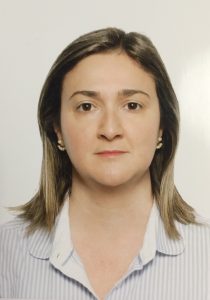Livia Neves Borgheti Cardoso |
|
|
Graduate in Pharmacy-Biochemistry at the School of Pharmaceutical Sciences of Ribeirao Preto – University of São Paulo (2006). Master (2012) and PhD (2016) at the University of São Paulo under supervision of Prof. Dr. Maria Vitória L. B. Bentley. One-year PhD visitor at the University Medical Center Utrecht, under supervision of Prof. Dr. Raymond Schiffelers (2014). During the Master and PhD, worked in the pharmaceutical technology, cancer and gene therapy field. Vice-chair (2011) and chair (2012-13) of the AAPS University of Sao Paulo Student Chapter linked to the American Association of Pharmaceutical Scientists (AAPS) that was awarded by the AAPS “Outstanding Performance” for three years consecutively. Published more than 10 articles, 5 chapter-books and 25 abstracts in conferences. Areas of expertise: liquid crystals, drug delivery systems, gene silencing and nanotechnology. |
 |
Group: NanomalariaSupervisor: Xavier Fernández-Busquets |
|
Project: Extracellular vesicles as chloroquine drug delivery system to treatment of MalariaMalaria is a protozoan blood infection that occasioned 214 million cases with 438 thousand of deaths in 2015. Plasmodium cycle life, adverse physical environment of the blood fluid conditions and short half-lives of the drugs impose a formidable barrier for the treatment of malaria. To surpass these challenges, several drugs and regimes of administration have been used, however, they have failed because of drug resistance evolution mainly due to exposure of the pathogen to lower doses. To overcome these drawbacks and have effective treatment, rather than focusing all efforts on discovering new drugs whose efficacy is quickly decreased by the parasites evolution of resistance, an important strategy is the development of targeted drug delivery systems. Extracellular vesicles (EVs), which are membranous vesicles released by a variety of cell types into the extracellular space and are involved in cell-to-cell communication, are promising targeted drug delivery systems. EVs derived from the Plasmodium infected-RBC contribute to the general inflammatory condition, are related to the control of balance between virulence and transmission and can spreading drug resistance in the parasite population. In addition, infected RBCs are able to internalize EVs and transfer them into the parasite cytosol. Taken together, these data show that EVs could be a promising targeted drug delivery system. Chloroquine (CQ), one of the most useful drugs ever discovery, is cheap, relatively safe and has several pharmacokinetic and pharmacological advantages over other antimalarial drugs. However, CQ has become resistant to P. falciparum. Currently, CQ is used as first line drug against other species. It was suggested CQ is returning to combat P. falciparum malaria. Therefore, we are proposing to use EV obtained from infected RBC to specifically deliver chloroquine to the treatment of malaria, which could be a promising strategy to reach the effective treatment for malaria. |
|
